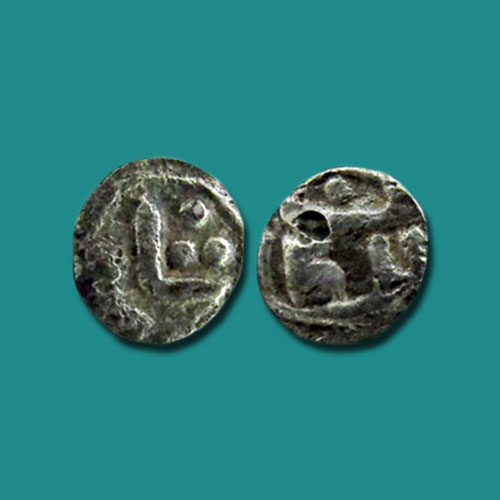1/32 Silver Tanka of Ghiyath Al-Din Azam Shah
2019-01-07 Mon
Ghiyath Al-Din Azam Shah was one of the most prominent sultans of Bengal Sultanate. He was the third ruler form Ilyas Shah dynasty who ruled Bengal Sultanate from 1839 CE to 1410 CE. He sat on the throne of Bengal Sultanate after overthrowing his father Sikandar Shah at the battle of Goalpara in 1390.Ghiyath Al-Din Azam Shah ruled Bengal Sultanate for almost 21 years. After sitting on the throne of Bengal Sultanate he also conquered Kamarupa, (today in modern Assam) during the beginning period of his reign. He also establishes a good political relationship with the Ming Empire of China.
Ghiytah Al-Din Azam had issued coins in gold and silver. In gold, he issued denominations like Tanka, and one-Sixteen Tanka. Gold tanks issued by him weigh around 10.8 to 11.6g, and One-Sixteen Tanka issued by him weighs around 0.7g. In silver, he issued denominations like Three-Tanka, Tanka, Half-Tanka, Quarter-Tanka, One-Eighth Tanka, One-Sixteen Tanka, and One-Thirty-Second part.
This 1/32 Tanka was issued by Ghiyath Al-Din Azam Shah. The weight of this coin is around 0.30 g. The obverse of this coin is inscribed as ‘Shah Azam’ and reverse of this coin is inscribed as ‘Al-Sultan’.
Image Courtesy: Rajgor’s Auction
Latest News
-
Malwa Sultan Mahmud Shah Silver Coins
2025-09-11 ThuMalwa Sultan Mahmud Shah minted silver coins in round and square flans. <br><br> For round coins,...
-
Malwa Sultan Mahmud Shah Billon coin
2025-08-26 TueMalwa Sultan Mahmud Shah's billon coins followed three weight standards: 100 rati, 96 rati, and 80 r...
-
Fascinating Archaeological Facts on Postage Stamps - 91
2025-08-23 SatRhinoceros is one of the oldest land mammal species existing in India. There are five species of rhi...
-
Fascinating Archaeological Facts on Postage Stamps - 90
2025-08-23 SatUthiramerur, a Village in Kanchipuram, Tamil Nadu, is notable for its Temple inscriptions that descr...
-
Fascinating Archaeological Facts on Postage Stamps - 89
2025-08-21 ThuThe term “millet” is derived from the Latin word “milum,” which translates to grain. millets...

